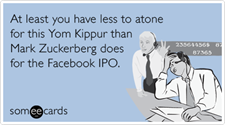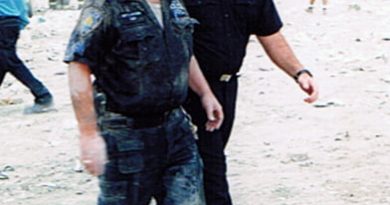Yom Kippur…better with age
 Judaism has several “kids’ holidays.” Chanukah with the gifts. Purim with the costumes. And many families also make Passover “family friendly” by doing stuff like interactive plagues.
Judaism has several “kids’ holidays.” Chanukah with the gifts. Purim with the costumes. And many families also make Passover “family friendly” by doing stuff like interactive plagues.
Yom Kippur, on the other hand, is definitely NOT a kids’ holiday. Not only that: I think to really appreciate Yom Kippur, to really get the full spiritual potential of the holiday, you probably need to be pretty mature. Say over 50. And I find it gets more powerful spiritually every year.
The Talmud teaches that “death and Yom Kippur” atone. Most of us aren’t anxious for death, thank you, so we take our atonement on Yom Kippur. But the holiday has a “life and death” vibe about. In a way it’s rehearsal for our death. We don’t eat or drink for 25 hours, not even water…dead people don’t eat either. We wear a kittle, a white garment that is reminiscent of the tachrichim, the shrouds, that traditional Jews are buried in. At many points in the liturgy we are pleading with God for our lives: begging for another year, throwing ourselves on the mercy of the court.
It’s a well-known phenomenon that people often experience profound change and personal growth after a brush with death. Many people who have survived a bout with cancer, come out of it and make major changes in their life. In his book “This is Real and You are Completely Unprepared,” Rabbi Alan Lew describes how Dostoyevsky once thought the Czar was going to execute him, and he went through a whole process of getting reconciled with the idea of dying; when it turned out the Czar was only joking, and he wasn’t executed, Dostoyevsky’s life was still forever changed.
Being confronted with the idea that you might die really focuses your attention. You become aware of what’s important. You become aware of time slipping away. You are reminded that if you’re not happy with the life you are living and you don’t want to be full of regret on your deathbed, you better get off your tush and do something about it. Now.
Yom Kippur is designed to give us that kind of “near death” experience without actually getting too near to death. It’s supposed to help us have that same transformative experience as a brush with cancer or surviving a bad car wreck, without actually having to risk our necks.
The problem for younger people is death is too abstract. But once you turn 50, things change. Dying isn’t only something for your parents’ generation to worry about. Once you have some friends/relatives around your age die, you become much more aware of your mortality. And being more aware of your mortality, a “dress rehearsal for your death” takes on much more meaning. It feels much more real. Begging for another year isn’t so far-fetched when you have friends your own age who DIDN’T get another year.
And Yizkor (the memorial service recited at many Jewish holidays) is certainly a much more powerful experience when you’re 50-something than when you are 20-something. Every year, the list of people you remember at Yizkor grows. It’s a time of life when many of us start to lose our parents, which is very hard indeed. For me, Yizkor becomes a collage of brief flashes of memory of the friends and family I have lost…sipping coffee with my Mom on her balcony at dawn, my grandmother feeding me at her kitchen table, sailing off the coast of Israel with my friend Marty, drinking sake (a LOT of sake, actually) and eating sushi with my friend Ron, smoking a cigar in Mexico City with my friend Emerich, going to see Bullitt at Radio City Music Hall with my Uncle Natie, etc. Every year there’s someone else to remember. Another person to shed a tear for.
Another major aspect of Yom Kippur is forgiveness…both being forgiven yourself and forgiving others. Forgiving becomes both more difficult to do as you get older…and more essential. How long can you carry a grudge before you realize the harm it is doing to yourself? The longer you wait the harder it is to forgive, to move on. And yet it’s also more important. If you wait too long, you may lose the opportunity to reconcile. Who sins more, old people or young people? Hard to say…sin knows no age boundaries. But I find as I get older, and have had experiences that have been emotionally difficult – like losing my Mom – my heart is somewhat more open and I’m more conscious of my flaws. Awareness of one’s mortality also encourages the kind of honest introspection that goes with spiritual growth.
I don’t mean to say the holiday is totally lost on the young. I was discussing this with my 16-year-old daughter, who is unusually introspective for someone her age, and she felt the holiday can also have meaning even for teens. They often carry grudges or hate, and need to learn to let it go. But I feel it really takes on much more depth and meaning the older you get.
And that depth and meaning contribute to accumulating “wisdom.” Which is one of the small consolations of aging. From the time you’re about 20 years old, your body is in decline. You’ll never be as fast, as strong, see as sharply, hear as clearly as when you’re 20. But we make up for it, hopefully, by acquiring some wisdom. And wisdom is not acquired just by reading a lot of books. It’s acquired the hard way, by living through the painful experiences that go with life, living through loss, through disappointment, through some “learning experiences” that go with bad decisions, through all of those challenges you have to face to get through life.
All that being said, here in Israel at least, there is one aspect of Yom Kippur that makes it a “kids’ holiday.” I’m not sure why, but on Yom Kippur even Jews who aren’t religious don’t drive. Partly because NOTHING is open, but I think it’s also out of respect for this most awesome and holy day on the Jewish calendar, and respect for their neighbors. And non-Jews don’t drive through Jewish neighborhoods. So the streets are completely devoid of cars. It’s eerie – Jerusalem, a city of over half a million people, so quiet you would think you were out in the country somewhere.
And kids take advantage of the lack of traffic to joyfully ride their bikes and skateboards right in the middle of the street, with no worries about cars. I sort of wish we could have another day a year like that, without the fasting and spending all day in shul. Would be a great day to go for a long distance bike ride on the roads!


Absolutely YK gets better and the fast gets easier with every new year.